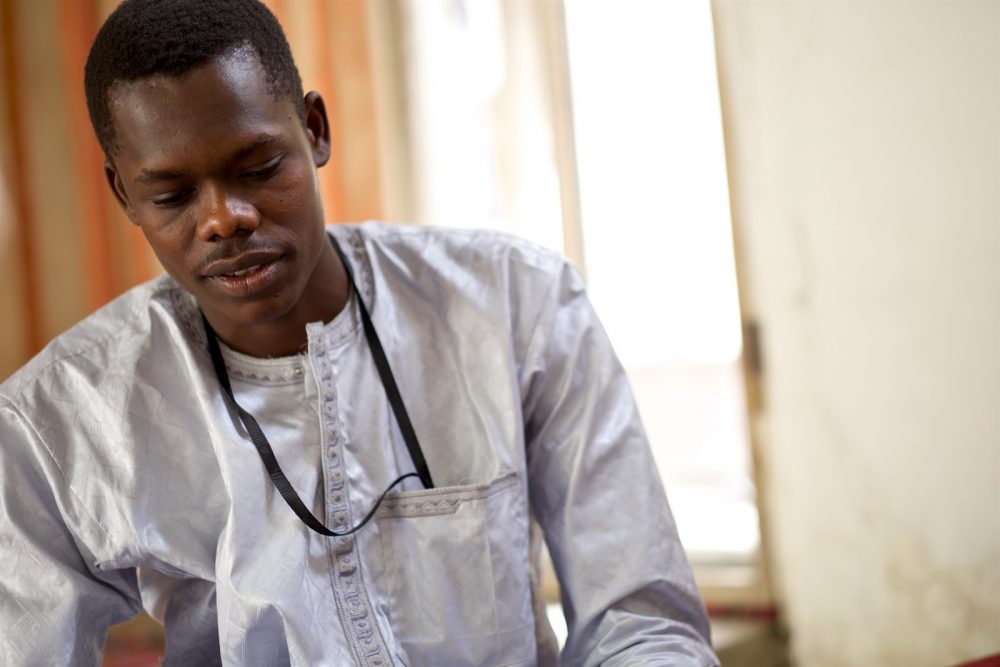“Your appointment is in a week,” the government official stated over the phone. “Come to our office in the capital city and give us an account of your activities.”
The official was accusing Phillip, a Frontiers team leader, of working illegally in the African Muslim-majority nation that he and his family called home. “You could be expelled,” the official threatened before hanging up.
Phillip’s heart felt heavy as his mind raced through the myriad directions this could go. At best, he’d have a chance to explain his work—how he and his wife, Mary, loved the country. Along with their teammates, they served Muslim communities by digging wells throughout the drought-prone region and installing solar panels in places with no electricity. If the authorities heard about their work, maybe they wouldn’t revoke his visa and expel his family.
Phillip and Mary wanted to stay—in spite of all their trials.
Living in a remote, Muslim region wasn’t easy. Phillip and Mary had faced many trials. The climate was hot and dusty throughout most of the year. Illness was a regular occurrence in their household. And their daily encounters with poverty and corruption exhausted them.
But this new threat made Phillip and Mary profoundly aware of how much they wanted to stay—in spite of all their trials.
As Phillip started the two-day journey across harsh desert to the capital, he asked God to take his fear and give him wisdom. “Do not be anxious about how you should defend yourself or what you should say,” Phillip remembered from Luke 12:11–12. “The Holy Spirit will teach you in that very hour what you ought to say.”
In 1820, missionary Adoniram Judson faced expulsion from Burma. The night before he was to plead his case to the king, Judson wrote,
We lie down in sleepless anxiety. To-morrow’s dawn will usher in the most eventful day of our lives. To-morrow’s eve will close on the bloom or the blight of our fondest hopes. Yet it is consoling to commit this business into the hands of our heavenly Father,—to feel that the work is his, not ours; that the heart of the monarch, before whom we are to appear, is under the control of the Omnipotence; and that the event will be ordered in the manner most conducive to the divine glory and the greatest good. God may, for the wisest purposes, suffer our hopes to be disappointed; and if so, why should short-sighted, mortal man repine? Thy will, O God, be ever done; for thy will is inevitably the wisest and the best.
Phillip, too, could trust God to order events to bring the most glory to His name.
But his meeting in the capital started badly. Karim, an imposing government official, interrogated Phillip. He barked out questions and accusations without giving Phillip a chance to fully respond to any of them.
“Do you realize I have the power to expel you from the country?” Karim challenged Phillip as he leaned over him.
“God may, for the wisest purposes, suffer our hopes to be disappointed.”
Phillip replied carefully. “I know that it is only by your kindness that I am in your land.” Tears stung his eyes. “I know that the day you no longer want me, I must leave.”
The official straightened and stepped back. Phillip’s words had caused his hostility to disappear and his countenance to soften. Karim looked distraught, even sad.
“Please do not think we don’t want you here,” Karim pleaded. “You’ve left your relatives and your home and your comfort to come here to suffer alongside our people and help us. Never say we don’t want you. You are welcome here.”
The conversation was no longer about expulsion. It was about hospitality, a value deeply ingrained in the culture of this desert nation—a place where welcoming strangers is a matter of life or death.
Karim wielded the power to bar Phillip and his family from his land. But now it came down to hospitality. With his honor in question, Karim declared Phillip as his guest—not his enemy.
But for unknown reasons, some people still wanted Phillip out. “You can stay in our country,” Karim said. “But you must leave the town you live in.” It was an olive branch, and Phillip took it. He left with a mixture of relief and heartache.
Fortunately, his teammates would be able to stay in the town and continue their work and ministry. They helped his family pack up their belongings as Phillip and Mary said goodbye to their local friends. Then they drove to their new home in the regional capital, four hours away.
“Please do not think we don’t want you here. Never say we don’t want you. You are welcome here.”
Many Frontiers workers like Phillip and Mary face threats to their longevity on the field. In fact, most long-term workers will face visa problems at some point in their ministries.
And the unexpected upheavals that accompany visa troubles—compounded with the other physical, emotional, and spiritual challenges of life overseas—can be overwhelming.
Please pray with us for workers, their visas, and their longevity on the field.
- Pray for governing officials to show favor to workers; ask God to release visas for long-term workers who have been waiting and praying.
- Ask the Lord to give workers like Phillip and Mary grace as they face unexpected transitions and uncertainty over their ability to stay.
- Pray they will remember Jesus Christ has given us an eternal home and inheritance (2 Corinthians 5:1–5, John 14:2–3, 1 Peter 1:3–5).
This account comes from a long-term worker. Names and places have been changed for security.
